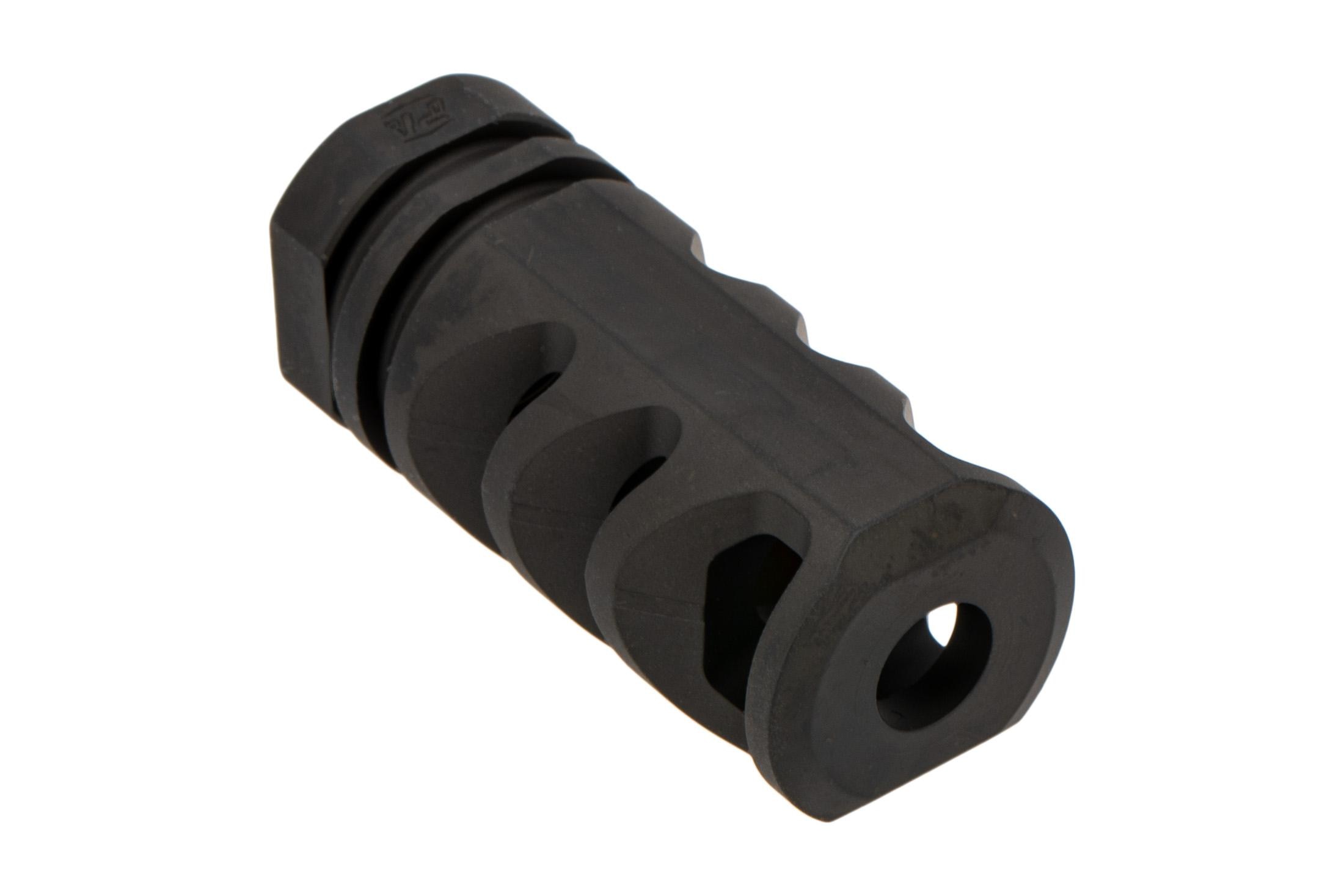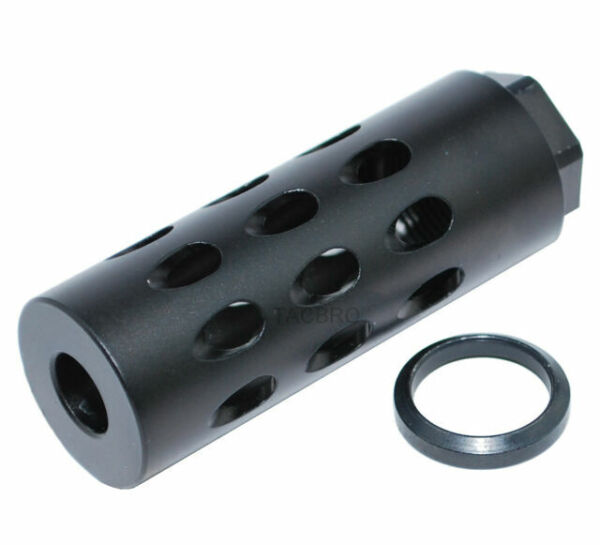When it comes to firearms accessories, the debate between muzzle brake vs compensator is one of the most hotly contested topics among enthusiasts and professionals alike. Both devices are designed to improve shooting performance, but they function differently and cater to distinct needs. Understanding the differences between a muzzle brake and compensator is crucial for anyone looking to enhance their firearm's efficiency and accuracy. This article will delve into the intricacies of each device, helping you make an informed decision.
The choice between a muzzle brake and compensator depends on your specific shooting requirements and preferences. Whether you're a recreational shooter, a competitive marksman, or a tactical operator, this guide will provide you with the knowledge you need to select the right accessory for your firearm. We'll explore the technical aspects, advantages, disadvantages, and real-world applications of both devices.
By the end of this article, you'll have a clear understanding of the differences between muzzle brakes and compensators, enabling you to choose the best option for your shooting needs. Let's dive in and explore the world of muzzle control devices.
Read also:Exploring Dr Mike Israetels Height Insights Into His Life Achievements And More
Table of Contents
- Introduction to Muzzle Devices
- What is a Muzzle Brake?
- What is a Compensator?
- Key Differences Between Muzzle Brake and Compensator
- Performance Comparison
- Advantages of Muzzle Brakes
- Advantages of Compensators
- Disadvantages of Muzzle Brakes and Compensators
- Choosing the Right Device
- Real-World Applications
Introduction to Muzzle Devices
Muzzle devices are attachments that fit onto the end of a firearm's barrel to enhance its performance. These devices are designed to manage recoil, muzzle rise, and muzzle blast, ultimately improving shooting accuracy and comfort. The two most common types of muzzle devices are muzzle brakes and compensators. While both serve similar purposes, their designs and functions differ significantly.
In this section, we'll explore the fundamental concepts behind muzzle devices and why they are essential for modern firearms. Understanding the role of these accessories will provide a solid foundation for delving deeper into the specifics of muzzle brakes and compensators.
What is a Muzzle Brake?
A muzzle brake is a device designed to reduce recoil and muzzle rise by redirecting propellant gases exiting the barrel. This redirection helps counteract the forces generated during firing, making the firearm more stable and easier to control. Muzzle brakes are particularly popular among hunters and long-range shooters who prioritize recoil management.
How Muzzle Brakes Work
Muzzle brakes function by utilizing ports or vents that direct propellant gases perpendicular to the barrel's axis. This redirection creates an opposing force that counteracts the rearward movement caused by recoil. As a result, the shooter experiences less felt recoil, allowing for quicker follow-up shots and improved accuracy.
Studies have shown that muzzle brakes can reduce felt recoil by up to 50%, depending on the firearm and ammunition used. This makes them an excellent choice for firearms with significant recoil, such as large-caliber rifles.
What is a Compensator?
A compensator, also known as a muzzle compensator, is designed to reduce muzzle rise by redirecting propellant gases upward. This upward redirection creates a downward force that counteracts the tendency of the firearm's muzzle to rise during firing. Compensators are widely used in competitive shooting and tactical scenarios where maintaining muzzle control is crucial.
Read also:Joseph Gordonlevitt A Comprehensive Guide To The Versatile Actor And Filmmaker
How Compensators Work
Compensators feature ports or vents on the top side of the device that redirect propellant gases upward. This redirection generates a downward force that stabilizes the firearm's muzzle, allowing the shooter to maintain better control during rapid firing. Unlike muzzle brakes, compensators focus primarily on reducing muzzle rise rather than recoil.
Research indicates that compensators can significantly reduce muzzle rise, improving shooting accuracy and speed in scenarios requiring rapid follow-up shots.
Key Differences Between Muzzle Brake and Compensator
While both muzzle brakes and compensators aim to enhance shooting performance, they differ in several critical aspects:
- Purpose: Muzzle brakes focus on reducing recoil, while compensators prioritize reducing muzzle rise.
- Design: Muzzle brakes typically feature ports on the sides and rear of the device, whereas compensators have ports on the top side.
- Noise and Blast: Muzzle brakes tend to increase muzzle blast and noise, while compensators have a more moderate effect on these factors.
- Use Case: Muzzle brakes are ideal for long-range shooting and hunting, whereas compensators excel in tactical and competitive shooting scenarios.
Understanding these differences is essential for selecting the appropriate device based on your shooting needs.
Performance Comparison
To better understand the performance of muzzle brakes and compensators, let's compare them across several key metrics:
Recoil Reduction
Muzzle brakes are the clear winner in terms of recoil reduction. Their design allows them to redirect propellant gases effectively, resulting in a significant decrease in felt recoil. This makes them ideal for firearms with heavy recoil, such as large-caliber rifles.
Muzzle Rise Reduction
Compensators excel in reducing muzzle rise, making them the preferred choice for scenarios requiring rapid follow-up shots. Their upward gas redirection creates a downward force that stabilizes the firearm's muzzle, improving shooting accuracy and speed.
Noise and Blast
Muzzle brakes tend to increase muzzle blast and noise due to the redirection of propellant gases. This can be a drawback in certain environments, such as hunting or tactical operations where stealth is important. Compensators, on the other hand, have a more moderate effect on noise and blast, making them a better option in such scenarios.
Advantages of Muzzle Brakes
Muzzle brakes offer several advantages that make them a popular choice among shooters:
- Recoil Reduction: Muzzle brakes significantly reduce felt recoil, making firearms easier to control and improving shooting accuracy.
- Improved Stability: By counteracting recoil forces, muzzle brakes help maintain better stability during firing.
- Enhanced Accuracy: Reduced recoil allows shooters to maintain a steady aim, resulting in more accurate shots.
These advantages make muzzle brakes ideal for long-range shooting and hunting applications.
Advantages of Compensators
Compensators also offer several benefits that cater to specific shooting needs:
- Muzzle Rise Reduction: Compensators effectively reduce muzzle rise, allowing for quicker follow-up shots and improved accuracy in rapid-fire scenarios.
- Better Control: By stabilizing the firearm's muzzle, compensators enhance overall shooting control and precision.
- Reduced Noise and Blast: Compared to muzzle brakes, compensators have a more moderate effect on noise and blast, making them suitable for environments where stealth is important.
These advantages make compensators a preferred choice for competitive shooting and tactical operations.
Disadvantages of Muzzle Brakes and Compensators
Despite their benefits, muzzle brakes and compensators also have some drawbacks:
- Muzzle Brakes: Increased noise and muzzle blast can be a disadvantage in certain environments. Additionally, the added weight and length of the device may affect firearm balance.
- Compensators: While compensators have a more moderate effect on noise and blast, they may still increase these factors compared to an unmodified barrel. The added weight and length can also impact firearm balance.
It's important to weigh these disadvantages against the benefits when choosing a muzzle device.
Choosing the Right Device
Selecting the appropriate muzzle device depends on your specific shooting needs and preferences. Consider the following factors when making your decision:
- Shooting Application: Determine whether you prioritize recoil reduction (muzzle brake) or muzzle rise reduction (compensator) based on your shooting scenario.
- Firearm Type: Different firearms may benefit more from one device over the other. For example, large-caliber rifles often perform better with muzzle brakes, while tactical rifles may excel with compensators.
- Environmental Factors: If stealth and reduced noise are important, a compensator may be the better choice. Conversely, if recoil management is your primary concern, a muzzle brake may be more suitable.
Taking these factors into account will help you choose the right device for your firearm and shooting needs.
Real-World Applications
Muzzle brakes and compensators are widely used in various shooting scenarios, each catering to specific requirements:
Hunting
Muzzle brakes are popular among hunters due to their ability to reduce recoil, making it easier to maintain accuracy during long-range shots. The increased noise and muzzle blast are generally not a concern in hunting environments.
Competitive Shooting
Compensators are the go-to choice for competitive shooters who need to maintain precise control during rapid-fire sequences. Their ability to reduce muzzle rise enhances shooting accuracy and speed.
Tactical Operations
Both muzzle brakes and compensators are used in tactical operations, depending on the mission requirements. Muzzle brakes are favored for their recoil reduction capabilities, while compensators are chosen for their ability to stabilize the firearm's muzzle.
Kesimpulan
In conclusion, the debate between muzzle brake vs compensator ultimately comes down to your specific shooting needs and preferences. Muzzle brakes excel in recoil reduction, making them ideal for long-range shooting and hunting, while compensators shine in reducing muzzle rise, enhancing accuracy and speed in rapid-fire scenarios.
We encourage you to explore both options and consider the factors discussed in this article when making your decision. Don't forget to leave a comment sharing your thoughts or experiences with muzzle devices. Additionally, feel free to explore other articles on our site for more insightful content on firearms and accessories.


